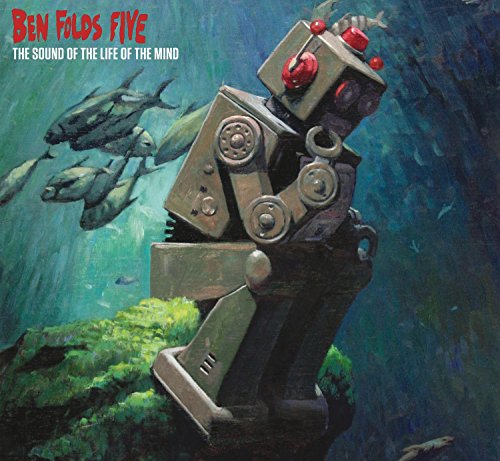
Ben Folds Five
The Sound of the Life of the Mind
Release Date: Sep 18, 2012
Genre(s): Pop/Rock, Adult Alternative Pop/Rock, Alternative/Indie Rock, Alternative Pop/Rock, Alternative Singer/Songwriter
Record label: ImaVeePee Records
Music Critic Score
How the Music Critic Score works
Buy The Sound of the Life of the Mind from Amazon
Album Review: The Sound of the Life of the Mind by Ben Folds Five
Satisfactory, Based on 8 Critics
Based on rating 7/10
Ben Folds Five is one of the best bands from the ‘90s, period. Their 1995 self-titled debut was a lavish power-pop banquet, positively filled to the gunwales with indelible hooks and clever lyrics. It provided a sanctuary for indie-minded music fans who stood in opposition to the roundly glum alternative landscape at the time (Ben Folds himself has described the band’s music as “punk rock for sissies”).
Based on rating 7/10
Outside of a decent yet forgettable, one-off new track that appeared on Ben Folds' 2011 Best Imitation of Myself: A Retrospective compilation, it's been an awfully long time since the Ben Folds Five have graced listeners with a full-on dose of their signature blend of nostalgia and snark. Sound of the Life of the Mind, the trio's fourth studio album pretty much picks right up where 1999's Unauthorized Biography of Reinhold Messner left off. Anchored by the instantly familiar interplay between Robert Sledge's distorted bass, Folds' percussive yet always melodic piano, and Darren Jessee's meaty yet always lyrical drum work, the first two cuts -- the funereal, art-punk-infused "Erase Me" and the retro-pop gem "Michael Praytor, Five Years Later," the latter of which sounds like it was egregiously left off of Jellyfish's Spilt Milk -- sound like they arrived via wormhole.
Based on rating 3/5
The last time piano-nerd-poet Ben Folds made an album with his Ben Folds Five bandmates, Bill Clinton was in office, The Phantom Menace was tarnishing the Star Wars legacy in real-time, and Napster was just starting to dismantle the music industry. But since that album, 1999’s The Unauthorized Biography of Reinhold Messner, it’s not like Folds shoved his piano in the closet and rested on his laurels: He released three solo albums, produced William Shatner’s 2004 spoken-word album Has Been, collaborated with novelist Nick Hornby on 2010’s Lonely Avenue, and even made an extremely unlikely return to the mainstream as a vocal coach on NBC’s a-capella music competition, The Sing-Off. During that time, Folds settled into his role as a playful alt-rock elder statesmen, nabbing a couple minor, goofy hits (the corporate-rock parody “Rockin’ the Suburbs,” the hilarious Dr.
Based on rating 6/10
Since Ben Folds’ ego apparently decided that his already indulgent band name was precisely one word too long after 1999's underrated . . .
Based on rating C+
Louis C.K. knows what it?s like to be male, middle class, and white: ?I open my eyes, remember who I am, what I?m like, and I just go, ?Ugh.?? And like the bat signal cast on an Ambien cloud, Ben Folds Five saw the sign and answered C.K.?s call, emerging with their first album in 13 years. Shamon! Besides sharing the same birthday, Louis C.K. and Ben Folds have quite a bit in common.
Based on rating 2.5/5
Is there a difference between Ben Folds and his band Ben Folds Five? This is the primary question raised by The Sound of the Life of the Mind, the first new Ben Folds Five album since their piano-hammering frontman disbanded the group in 2000. The acrimonious hiatus continued until last year, when, ironically, the trio regrouped to record bonus material for a box set that underscored the efforts of Folds’s many collaborators and emphasized his solo work. The resulting three-disc compilation, Best Imitation of Myself, showed how hesitant Folds has been to drift from the sniveling pop formula he developed with the band in the ‘90s.
Based on rating 3.5/10
Ben Folds Five's first album in 13 years opens with a piano noodling over a sludgy bass guitar groove, as if to dispel any notion that The Sound of the Life of the Mind might just be Folds without the Five. He's on piano, of course, but that's the perfectly named Robert Sledge back on fuzz bass and Darren Jessee, a welcome presence on drums. For better or for worse, "Erase Me" has all the hallmarks of pre-Reinhold Messner BFF: the spry instrumental interplay that marks their best material but was sorely missed when the piano man went solo; the too-clever lyrics that mistake recrimination for emotion; and a sturm-und-drang that winks at metal but, you know, it's on piano so it's funny.
Opinion: Fairly Good
The trio’s comeback is a welcome one, but this fourth album is no catalogue classic. Chris Beanland 2012 The good news is that one of the most consistently entertaining pop-rock bands of the 1990s is back together. The bad news is that the album they've released to mark their comeback isn't quite a classic. And it's hard to be sure of the reasons why that's the case.
'The Sound of the Life of the Mind'
is available now

